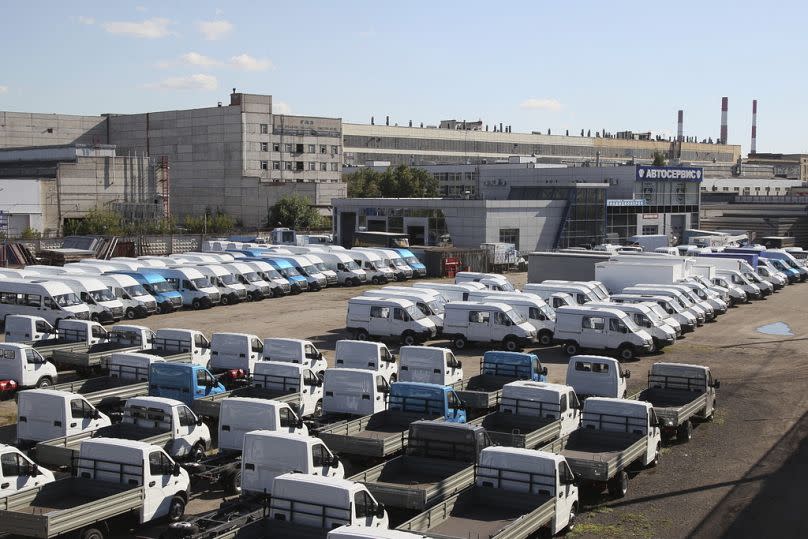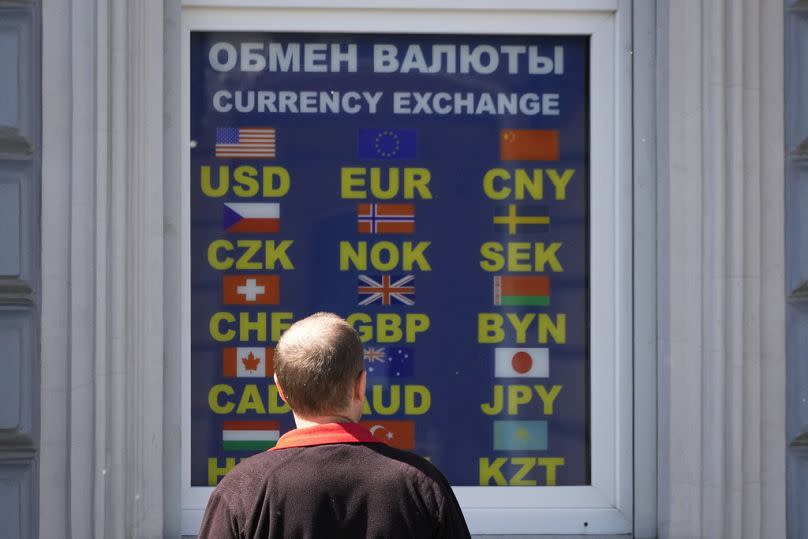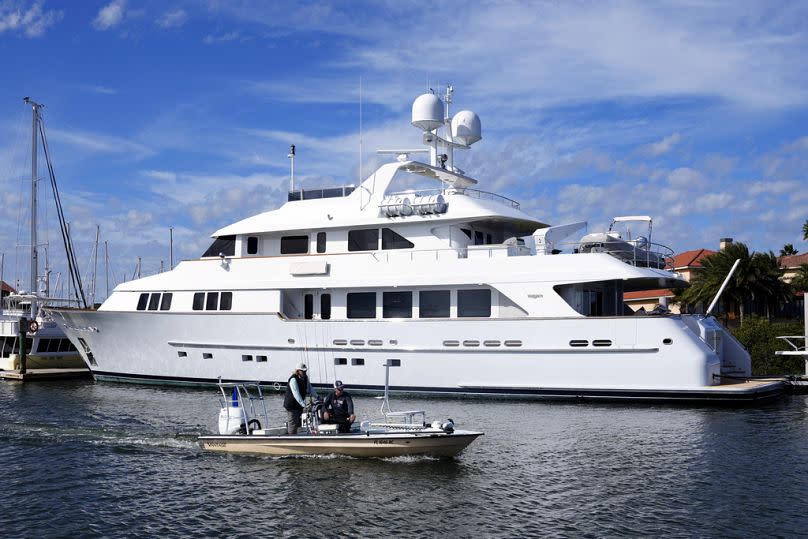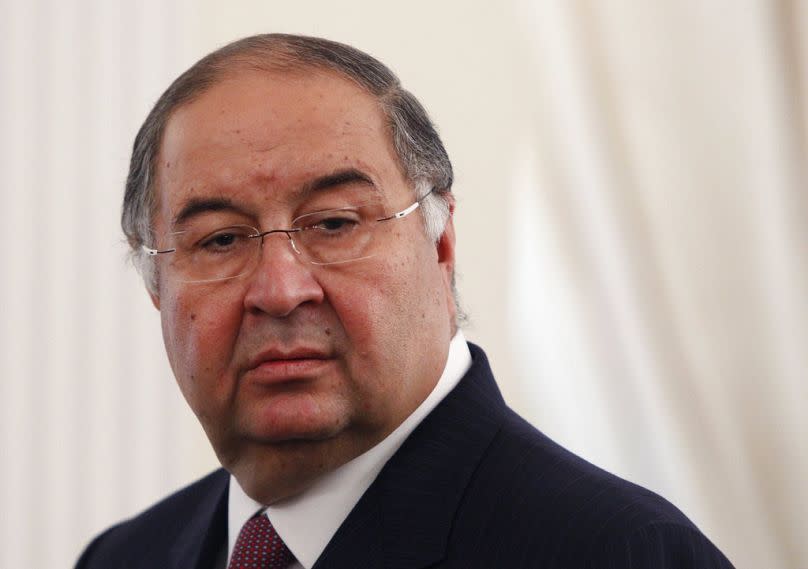Since Russia’s full-scale invasion of Ukraine in early 2022, a slew of Western sanctions have been aimed at halting Russian President Vladimir Putin’s economy and advances.
These measures came on top of those already imposed by Brussels against the Kremlin for its initial invasion of Ukraine’s east and unilateral annexation of Crimea in 2014.
However, the second batch of sanctions was much broader in scope, targeting the state, businesses and individuals alike.
As the war rages on well into its third year, questions have arisen about whether an economy such as Russia’s has managed to absorb the hit and whether there is more to Moscow’s messaging on the restrictions’ ineffectiveness than mere propaganda.
Euronews spoke to Vladislav Inozemtsev, an economist, political scientist, and advisor at the MEMRI Institute in Washington, about just how effective these restrictions are and who they are really impacting.
Euronews:* Ukraine’s recent incursion into Russian territory amid support from Western allies has made the Kremlin increasingly nervous. But are the economic sanctions yielding results?*
Vladislav Inozemtsev:** In Russia, sanctions are being laughed at. Recently, the approval of the script of a comedy film became known, where, according to the plot (US President) Joe Biden, tired of hearing from his advisers that the sanctions still can not “finish off” Russia, decides to go incognito to Moscow to understand the reasons for the “stability of the Russian economy”.
But Russians — entrepreneurs especially — are not as cheerful as the propagandists: the sanctions put serious pressure on them. The country is almost deprived of the car industry created by Western companies in the 2000s and 2010s. Export-oriented industries have sagged: forestry, metallurgy, and gas production. But we should not forget a few points.
Firstly, all this does not have a critical impact on the economy as a whole: it is reoriented to the domestic market, and the budget “suffocates the problems with money”. Secondly, the sanctions have not paralysed the military-industrial complex or provoked anti-war mobilisation. Thirdly, they are, after all, a double-edged blade.

Euronews: What do you mean by that?
Inozemtsev:** They also affect those who introduced them. Examples are well-known: severing ties with Russia in the energy sector inflated gas prices in 2022, forcing the European authorities to subsidise consumers, according to some sources — I find them hard to believe — by almost €800 billion, and at the same time this boom gave (Russian President Vladimir) Putin $78bn (€70.5bn) of additional export revenues in 2022.
The seizure of the Bank of Russia’s assets, which Europe failed to use in support of Ukraine, resulted in the confiscation of at least $140bn (€126bn) worth of property of Western investors in Russia. And that’s just the beginning.
Euronews:* In that case, which sanctions do you consider effective and which do not?*
Inozemtsev:** Sanctions today are a form of warfare. But in war, a successful operation is one in which the enemy has suffered more damage than your army.
I say something similar: sanctions are effective if they cause more damage to Russia than to the countries that impose them.
Related
Euronews:* But damage can be calculated in different ways.*
Inozemtsev:** Yes, and there are important nuances here. Europe, for example, has seized more than $58bn (€52bn) in property belonging to Russian businessmen. In response, most of those who spent years buying up assets in the West have returned to Russia.
The number of dollar billionaires there in 2024 has reached an all-time high, and they have rallied around Putin even more firmly than before: there is now nowhere to escape from the “golden cage”.
At the same time, Western authorities have already spent tens of millions of dollars securing seized property and have every chance of paying much more money as compensation for the legal costs of lost sanctions cases.
Euronews:* Have the sanctions justified themselves? From your articles, we can conclude that you are generally opposed to those measures that hit ordinary Russians, not the authorities.*
Inozemtsev:** Ilya Yashin and Andrei Pivovarov seem to think so, but not me.
For me, any sanctions against Russia and Russians which are of a justified and universal character and concern relations between the countries that impose them and Russia are acceptable.


Euronews:* Is the sanctions regime selective and not always logical?*
Inozemtsev:** You could say that. For example, if we believe that the war against Ukraine was started by the Russian elites, we should have imposed sanctions against all ministers, all deputies of the State Duma and the Federation Council and all members of Putin’s United Russia party.
If we believe that the Russian budget is being used to finance the war, we should impose sanctions against all individuals and companies paying — well, say, more than 100 million roubles (€1m) a year in federal taxes. The same goes for sectoral sanctions.
From the very beginning, I welcomed the ban on air travel with Russia. It may turn out that the market for flights from Europe to Asia is being taken over by Chinese companies that continue to fly the same routes and save passengers time and money, but at least everything is clear here: the connection has been interrupted.
But I can’t understand why only 48 out of 125 Russian billionaires are under sanctions, or why, for example, 60 Russian banks are under sanctions while almost 260 others are not.
Nor do I dispute Europe’s right to impose an energy embargo on Russia. But I don’t understand what grounds the Western authorities have for restricting or banning the sale of Russian oil to India, for example: it’s none of their business, it’s a sovereign relationship between third countries.
Euronews: The situation looks somewhat different than at first glance.
Inozemtsev:** Many experts say that labelling certain individuals as “oligarchs” or “influential Russian businessmen” is as arbitrary as declaring a person a “Trotskyist” or “counter-revolutionary” in Stalin’s times.
This is so because sometimes sanctions have been imposed on the basis of the opinions of clearly biased experts. This was the case with Mikhail Fridman and Petr Aven, taking into account an article by Ilya Zaslavsky, who had previously been dismissed from one of the firms they owned.
Sometimes false information was taken into account, which was later overturned by Western courts (an article in Forbes magazine, the wording of which was reproduced in the European Council’s decision on sanctions against Alisher Usmanov, was judicially recognised as libel, but the sanctions were never lifted).
As for the third countries, we can see that all the endeavours have failed to cut off Russia’s oil exports, while the revenues from them are growing.
Therefore, it is better to spend money on weapons for Ukraine rather than on “research” on the implementation of secondary sanctions — the damage to the Kremlin will be much greater.


Euronews: So, are sanctions against businesses often devoid of legal grounds?
Inozemtsev:** Based on a number of high-profile cases, I can say that they are arbitrary and, I would even say, extrajudicial.
For example, when the German prosecutor’s office started investigating Usmanov, it was initially unable to obtain a search warrant from the judges for a long time.
When it did obtain the relevant consent and conducted investigative actions, the Frankfurt Land Court ruled that the search warrant was unlawful.
So? The prosecutor’s office refused to stop the investigation and return the seized property. Is this normal for a state governed by the rule of law?
Or another case: according to the Cypriot authorities, at least 14 Russians who had previously legally obtained Cypriot citizenship within the framework of investment attraction programmes approved by the government were deprived of it in the light of sanctions. Once again, without any court order.
Euronews: Could you compare this to the case of Telegram’s Pavel Durov, who was recently detained in France?
Inozemtsev:** It is difficult not to compare it here: the man was accused of quite serious offences directly related to the business he created. But no one has taken away this business. No one deprived him of his documents, which were obtained in France in a rather dubious way, to put it bluntly.
By court order, he was placed under police surveillance — and the court rejected at least half of the charges and refused to arrest the businessman, as the prosecutor’s office had demanded. This is an understandable procedure that complies with legal norms, but there is nothing like it in sanctions practice.
We are even seeing attempts to impose sanctions against relatives of “oligarchs”, many of whom are not doing business in Russia at all.
For example, the son of Uralchem owner Nikita Mazepin, who was a driver in one of the F1 teams sponsored by his father, was sanctioned in 2022 and had to leave the team. His lawyers managed to challenge the sanctions two years later, which is to be welcomed.
Usmanov’s sister was sanctioned as a beneficiary of trusts set up to manage real estate and headed by independent directors. She had not managed their assets before, and six months ago she signed acts of exclusion from the trusts, preventing her from receiving any future benefits from them.
Thus, all possible methods of enforcing EU decisions have been exhausted, but the sanctions remain in force solely because of her family ties to Usmanov.


Euronews: But there are known cases of sanctions being lifted.
Inozemtsev:** Yes, the EU court has already lifted sanctions against the ex-wife of Fridman, Violetta Prigozhin, and Aleksandr Pumpyanskiy. They say that family ties cannot be the basis for the introduction or extension of sanctions restrictions. But again, each case is special, which should not be the case in a state governed by the rule of law.
All this does great damage not so much to Russian entrepreneurs — the Kremlin will find a way to sweeten their lives — but to the Western legal system.
Sanctions, in my opinion, remain an extra-legal pressure mechanism that is increasingly replacing entire bodies of legal decisions and leading to the erosion of the rule of law.
Euronews: This is a strong statement. What other arguments would you cite as evidence?
Inozemtsev:** There are many arguments. It is known, for example, that the law does not have retroactive force. Meanwhile, many Russian “oligarchs” were sanctioned from February to May 2022 with the wording that they “took part in a meeting with Putin on 24 February 2022”.
But at the time of that meeting, communicating with Putin was not considered by the EU to be a discreditable action.
Besides, we have been taught: you cannot punish twice for one offence. This does not apply in sanctions policy.
For example, in 2022 the EU imposed sanctions against Fridman and Aven, which they challenged and won in the EU Court of Justice. However, it soon turned out that in 2023, the European Council not only extended the sanctions against these businessmen but changed the wording so much that it made the decision new, requiring a challenge “from scratch”.
Meanwhile, from February 2022 to March 2023, both men were absent from Russia and were not involved in managing any projects there.
Finally, the law should punish uniformly for similar unlawful acts. The list of charges against Usmanov included the fact that he owned the daily newspaper Kommersant, which allegedly became a tool of Putin’s propaganda.
But in this case, how is it that Grigory Berezkin, the owner of RBC, from which many independent journalists were expelled in 2017, turned out to be so clean in the eyes of the EU that sanctions against him were lifted by a special decision without even bringing the case to a court verdict? Is this also proposed to be considered an example of the rule of law?
Related
Euronews: Many people talk about collective responsibility, which would lead to acknowledging evil in power and protests among the population. But ordinary people, outraged by the lack of, say, necessary medicines, turn their indignation not against the authorities but against the West.
Inozemtsev:** To punish citizens for their connection with the regime, start by recognising its criminal nature. This is what the judges of the Nuremberg Tribunal did, declaring the leadership of the NSDAP, the Wehrmacht high command, as well as the Gestapo, the SS and the SA criminal.
This allowed the courts established in the US zone of occupation to convict some big businessmen who collaborated with these organisations, mainly the management of the companies Krupp and IG Farbenindustrie, which produced weapons and chemical means of exterminating people in concentration camps, as well as using the slave labour of Jews and prisoners of war.
But those who did not do this, even paying taxes or supplying weapons to the Wehrmacht, were not found guilty.
Therefore, as long as Putin is only a suspect in war crimes, and the majority of Russian politicians and officials directly responsible for the preparation and conduct of the war do not even have this status but are simply under sanctions, it is illegal and nonsensical to extend the same measure of responsibility to businessmen.
It throws them into the hands of the regime instead of making them allies in the fight for a better Russia.
I’ve been saying this openly in the Western press since the first days of the war, but no one hears it: everyone thinks just a little more, and that’s it; the oligarchs will revolt, and the regime will collapse.
Frankly, I can’t imagine a greater naiveté. And I wrote about this even before the Russian invasion began.
